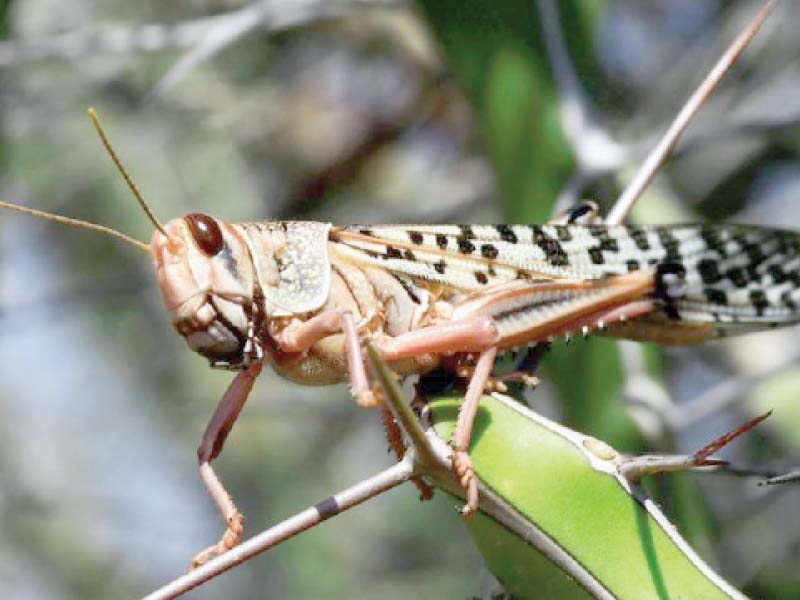
Locust attack poses famine risk
by Anadolu AgencyKARACHI / NEW DELHI: Still reeling from the impact of the coronavirus pandemic, another severe crisis is staring at Pakistan and India, one with the potential to impact their food security.
Swarms of locusts – short-horned grasshoppers – have invaded agricultural fields in both countries decimating crops and risking famine in the region. In Pakistan, hopper bands of the Schistocerca gregaria – commonly known as the desert locust – have already devoured large quantities of crops in over 60 districts of all the provinces. The locusts are believed to have entered into the southwestern Balochistan province, from neighbouring Iran.
These insects, mainly originating from deserts, eat anything from bark to seeds and flowers while travelling up to a speed of 93.2 miles (149 km) a day. The region saw the first wave of locust invasion in May last year since 1993. According to the UN Food and Agriculture Organisation (FAO), Pakistan’s 38% of agricultural fields are breeding grounds for the insects.
Out of which, 60% locusts breed in Balochistan alone – the country’s poorest province, followed by southern Sindh, 25%, and northeastern Punjab – the most populous province, 15%.
The UN agency said the locusts may have caused financial loss worth Rs600 billion ($3.72 billion). In India, swarms of locusts, invading agricultural fields in the northwest, are destroying seasonal crops.
Swarms heading Indian capital
After destroying crops in western Indian states of Rajasthan, Gujarat and Maharashtra, the locusts’ swarms are heading towards national capital Delhi in large numbers.
“Wind speed, in the next two days, is preferable for any movement from west towards Delhi. Thus, it is in favour of locusts. But we are expecting a change in the wind direction on Friday evening, which may reduce their impact in the urban setting,” Kuldeep Srivastava, head of the regional forecasting centre of the India Meteorological Department, told Anadolu Agency.
National Horticulture Research (Krishi Vigyan Kendra) teams are spraying chemicals early in the morning (4am to 7 am) when the locusts are inactive. But farmers say it is not enough.
Turkey helps Pakistan
Turkey is assisting Pakistan to improve its pest control system to overcome the locust plague. Ankara has handed over a purpose-built Piper Brave spray aircraft along with four crew members to Pakistan Air Force to combat locusts.
Unsatisfied with government efforts, farmers are using traditional but futile ways to get rid of insects.
In remote parts of Punjab, and Balochistan, farmers beat drums to keep the insect away. In other parts, they use smoke to cut the oxygen supply to insects.
Experts, however, believe that these desperate attempts have hardly any effect on the locusts.
“It (locust invasion) is a major threat than the coronavirus. The virus would not attack if you stay home or follow safety guidelines. But hunger will kill you in any way,” said Mahmood Nawaz Shah, Vice President of Abadgar (Farmers) Board, a body that represents farmers in Sindh province.
He told Anadolu Agency that the invasion of insects will trigger a food crisis if they are not contained before July – the monsoon season – which would increase their breeding manifold.
“The insects have already destroyed cotton, sugarcane, orchids and vegetable crops across the country. But the quantum of destruction in terms of food security will be many times higher if they attack the winter crops also,” he cautioned.
Farmers in India are already reeling from an economic crisis due to the Covid-19 lockdown. Many farmers in India allowed their crops to rot in fields as they could not find labour and transportation during the harvest season.
India, Pakistan, Iran in touch
In 1993, a similar locust attack had destroyed all crops in the western state of Maharashtra’s Amravati, Wardha and Nagpur districts.
Javed Humayun, a spokesperson for Pakistan’s food security ministry, however, downplayed the experts’ warning.
“No doubt, it’s (locust attack) a very serious issue, and we are considering it seriously. But as far as food security is concerned, we are lucky to have wheat, rice and other vegetables in abundance compared to our need,” he added.
“We do not foresee any food security at least in near future,” he maintained.
Sensing the gravity of the issue, the government has established a National Locust Control Centre to monitor and act against the onslaught of insects.
According to National Disaster Management Authority spokesman Saqib Mumtaz, a survey and control operation is under way in some 61 districts across the country to contain the locusts. Experts from both sides have urged governments in Pakistan and India to forge cooperation to launch a joint onslaught on locust.
“Both Pakistan and India should keep politics aside for a while and cooperate to get rid of this problem,” Shah said.
“These locusts are not stationary. They have no border restrictions. Therefore, if the two sides keep on (politically) cornering each other and do not act briskly under a joint plan against this onslaught, the people of both countries will have to suffer irrespective of nationality or religion,” he cautioned.
Speaking to Anadolu Agency, a senior Pakistani government official on condition of anonymity said officials concerned from Pakistan, Iran and India were in constant touch and updating each other with the latest situation on a daily basis.
Published in The Express Tribune, May 29th, 2020.